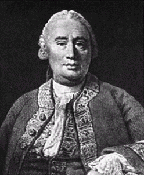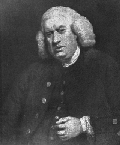Witnesses in the Trial
Public Execution
 David Hume's philosophy is regarded as one of the finest collection of works written in the English language; his philosophical works range from theories of causation to aesthetics. David Hume was the son of a minor Scottish landowner. His family wanted him to become a lawyer, but he felt an "insurmountable resistance to everything but philosophy and learning." Mr. Hume attended Edinburgh University, and in 1734 he moved to a French town called La Fleche to pursue philosophy. He later returned to Britain and began his literary career. As Hume built up his reputation, he gained more and more political power. His theoretical positions on aesthetics, applied to the execution of King Charles, make Hume a strategic witness for the prosecution. In his testimony, Hume relates the reasons he believes the public execution, regardless of the crime committed by the perpetrator, should not be upheld in any civilized state. Other works of Hume include Essays Moral and Political (1742), he later wrote An
Enquiry Concerning Human Understanding (1748) and An Enquiry Concerning the Principals of Morals (1748).
For more information on David Hume, click here.
David Hume's philosophy is regarded as one of the finest collection of works written in the English language; his philosophical works range from theories of causation to aesthetics. David Hume was the son of a minor Scottish landowner. His family wanted him to become a lawyer, but he felt an "insurmountable resistance to everything but philosophy and learning." Mr. Hume attended Edinburgh University, and in 1734 he moved to a French town called La Fleche to pursue philosophy. He later returned to Britain and began his literary career. As Hume built up his reputation, he gained more and more political power. His theoretical positions on aesthetics, applied to the execution of King Charles, make Hume a strategic witness for the prosecution. In his testimony, Hume relates the reasons he believes the public execution, regardless of the crime committed by the perpetrator, should not be upheld in any civilized state. Other works of Hume include Essays Moral and Political (1742), he later wrote An
Enquiry Concerning Human Understanding (1748) and An Enquiry Concerning the Principals of Morals (1748).
For more information on David Hume, click here.
 Born in 1709, in Lichfield, England, Samuel Johnson is one of the most highly regarded and best known English writers of the eighteenth century. In addition to his literary fame and following, Johnson is perhaps best known-not for is writing, but for his talking. With a genial and strong personality, Johnson should serve as an ample and important witness for the Defense in today's trial. While Johnson does not adamantly promote the idea of public execution, he argues that it is a viable method for criminal punishment and serves as a crime deterrent.
For more information on Samuel Johnson, click here.
Born in 1709, in Lichfield, England, Samuel Johnson is one of the most highly regarded and best known English writers of the eighteenth century. In addition to his literary fame and following, Johnson is perhaps best known-not for is writing, but for his talking. With a genial and strong personality, Johnson should serve as an ample and important witness for the Defense in today's trial. While Johnson does not adamantly promote the idea of public execution, he argues that it is a viable method for criminal punishment and serves as a crime deterrent.
For more information on Samuel Johnson, click here.
Football
Michael Hobart is a fictional witness on the side of the Prosecution. Hobart will address that anomalies associated with the bloody violence of football as a bloodsport. Hobart evokes images of kicking, hitting, and tackling to show the unpleasantly violent nature of football.
On the side of the Defense, Laurence Birmingham, a fictional witness, will argue that football allows participants to alleviate internal aggression in a substantially less violent manner than other types of "aggressive" activities, such as battery and assault.
Boxing
Robert Williamson is a fictional culture critic called to the stand by the Prosecution. Williamson will enumerate the rules of boxing and how the flexibility of such rules allows for an intolerably violent sport.
Testifying for the merits of boxing as a sport, fictional witness Christopher Olster will confirm that boxing brings a sense of community to eighteenth-century English society and even implies that boxing is a sport condoned by God.
Stick Fighting
A noted scholar, fictional witness Markus Greeley attests to the troubles of stick fighting. As a witness for the Prosecution, Greeley details the graphic nature of stick fighting in an attempt to expose the unacceptable violent nature of stick fighting.
Fictional character Edmund Browning will serve on the side of the Defense in an attempt to establish stick fighting as a credible sport.
Bull-Baiting
Fictional character David Dells uncovers the inhumane and largely unknown aspects of bull-baiting. He provides an expert opinion on the death of dogs as a result of bull-baiting.
Edward Paul, a fictional witness, provides evidence that it is unnatural for animals to engage in violence.
On the side of the Defense, fictional witness Noble Abraham Ebbelstone offers argues that bull-baiting is not detrimental to animals, and in fact can even extend the life of the bull.
Cock-Fighting
Fictional scholar Ian Worcester serves as a witness to the Prosecution as he offers some insight into his research on the popularity of cock-fighting. He attends such violent sports in an attempt to understand why such bloody sports are so popular among his fellow eighteenth-century Englishpeople.
On the side of the Defense, fictional witness and professor Robert Turner defends the right of the public and vendors to partake in the kind of entertainment they chose. Turner implies that such sports promote community unity.
Cock-Throwing
On the side of the Prosecution, fictional German intellectual Mark Schairbaum, describes the uncommonly violent nature of the sport of cock-throwing. In addition to other prosecution witness, T.M. Leigh, the two detail the danger of cock-throwing.











